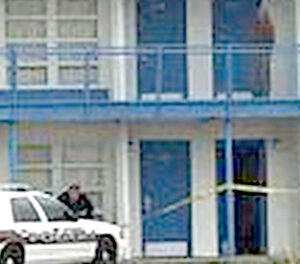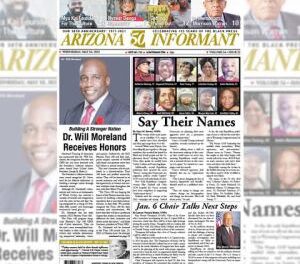By Karsonya (Kaye) Wise Whitehead
There comes a moment, somewhere between yesterday and today, when it feels like tomorrow may never come. I used to complain to my Nana about all the things that I had to do tomorrow, and she would shake her head, put down whatever book she was reading, and remind me that today’s burdens, if handled properly, could be yesterday’s victories and not tomorrow’s plans.

Credit: Courtesy photo
She also believed that tomorrow was a day that never came. Tomorrow, she said, was a North Star, a place to hide things and hold dreams. It was not a place where you planned to pay bills, or lose weight, or grieve properly. She said that waiting for tomorrow was like waiting for a special moment to use the good dishes or take the plastic off the living room couch. I liked to watch my Nana when she talked like this, mixing laughter with wisdom, her eyes twinkling and squinting at the dust trails of her life and the pathways for my future.
I think I was already a mother, two times over, on the day I showed up at the house, and she was sitting at the kitchen table, tapping her fingers and humming along to her beat. She cocked her head when I walked through the door and started talking even before I sat down. Her eyes, I noticed, were no longer brown, like summer almonds, but milky blue, like a cold winter morning. And, when I did not say anything, she asked me to take her hand. I knew it was coming. My great-grandmother, her mother, went blind from cataracts and glaucoma, and her eyes turned blue. She told me years before that she would fight it with everything she had but that, in the end, she was only going to see me in her dreams. My great-grandmother lost her sight long before she met me, and I grew up with her touching my face or grabbing my arm. She said she fought it for as long as possible because fighting and resisting are what we do; it’s who we are.
I come from a long line of fighters and resisters. See, in 1906, when my great-grandmother was 6 months old, the Ku Klux Klan knocked on their front door and asked her mother to ask her husband to step to the door. In a matter of seconds, he stepped to the front door, and they shot and killed him. I was told that my great-great-grandfather, Moses, was well known in the Olar, S.C., community, as he was trying to convince Black people to actively exercise their constitutional right to vote. He organized meetings at the local church and in his living room.
According to Ancestry.com, he was born in 1878 and grew up in and around Gaston, S.C. He married my great-great-grandmother, Bannah Dickinson and they had four children: Moses Jr., Louise, Leola, and my great-grandmother Lumisher. Little else is known about him other than the fabric pieces that I tried to pull together before my Nana (Lumisher’s oldest daughter) passed away.
I was told that he was part Cherokee and then I was told he was actually from Jamaica. My mother said he was probably very tall because my great-great grandmother Bannah was over 6 feet tall and would never have married a shorter man. I know she never remarried and that she died of congestive heart failure at the age of 74. They said he was a fighter, a resister. One great-uncle said that he was told that Moses never believed what White people told him if he could not verify for himself.
Although the family could not agree on most of the facts of his life, they all agreed on one thing: He was lynched by the local KKK because he was a force who refused to be silenced or ignored.
We are at a moment right now where all we have left is our ability to fight. We are witnessing the collapse of democracy and the creation of a fascist regime that is trying to break us, trying to silence us, and trying to erase us. Similar to glaucoma and cataracts, Trump 2.0 is a disease seeking to take away sight and convince us to believe what they are telling us and not what we see. It is during these moments that we must go back to what we know to be true. We know who we are. We know whose we are. And we know what it feels like to be under attack and what it feels like to fight. It is during these moments when we have to go back to the truth of who we are, cutting through the noise and pushing through the haze to stand tall on truth. That is what we teach because that is who we are. We are fighters. We are resisters. And we are clear-eyed survivors.
The post Year: 1906; Place: Gaston, S.C. My great-grandfather was lynched there appeared first on AFRO American Newspapers.











